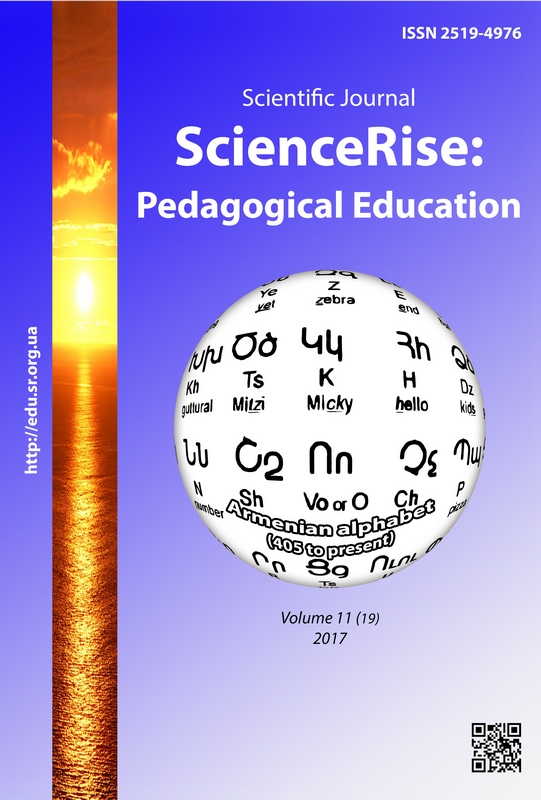Analysis of the concept of "health" in the context of education of senior adolescents in secondary educational institutions: structure, essence
DOI:
https://doi.org/10.15587/2519-4984.2017.116722Keywords:
health analysis, health components, social, physical, psychic and spiritual healthAbstract
The author’s paper defines the essence and structure of health and characterizes its components and signs, as a result of the theoretical analysis. Based on the analysis, generalization and systematization of scientific sources, there was theoretically analyzed the concept of “health”, defined its essence and characterized its main components and their signs. The author makes a conclusion that health is, first of all, the harmonious development of the human organism at optimal conditions, human adaptability to different life activity conditions; development of physical, social, psychic and spiritual components in correspondence, harmony with each other. Typical features of physical, social, psychic and spiritual components of health were separated and described. There were noted the following signs of the physical component of health: good functioning of all organs, normal development and absence of diseases. The signs of the social one are friendly relations between people; good life conditions that favor health strengthening. Ones of the spiritual components are the human’s perception of the environment, life with feeling of love, sympathy and responsibility, striving for becoming better. The psychic component has such signs: positive estimation of oneself and other people by a human, ability to overcome failures, to behavior as a master of own life. It was established, that all these components are closely connected with each other
References
- Maliarchuk, N. N. (2008). Valeolohiya. Tiumen, 280.
- Bondarenko, I. H. (2012). Valeolohiya. Ch. I. Mykolaiv: Vyd vo ChDU im. Petra Mohyly, 52.
- Mikheienko, O. I. (2009). Valeolohiya: osnovy indyvidualnoho zdorovia liudyny. Sumy: Universytetska knyha, 400.
- Valeolohiya (1996). Kyiv: T-vo «Znannia» Ukrainy, 336.
- Verkhatskyi, S. A. (1983). Istoriya medytsyny. Kyiv: Vyshcha shkola, 384.
- Putrov, S. Yu. (2013). Zdorovia u konteksti predmetnoho samovyznachennia filosofiy. Humanitarnyi visnyk ZDIA, 55, 152–162.
- Apanasenko, G. A. (1996). Valeologiya: imeet li ona pravo na samostoyatel'noe sushchestvovanie? Valeologiya, 2, 9–14.
- Orzhekhovska, V. M. (2004). Pedahohika zdorovoho sposobu zhyttia. Shliakh osvity, 7, 11–12.
- Boichenko, T., Vadziuk, P., Movchaniuk, V., Usatenko, T. et. al. (1994). Bazovyi zmist shkilnoi valeolohichnoi osvity. Valeolohiya, 20–34.
- Yatsuk, H. F., Barna, L. S., Bilous, L. I., Chornota, I. D. (2007). Zdorovia – naibilshe blaho. Ch. I. Za zdorovyi sposib zhyttia. Ternopil: Vydavnytstvo Aston, 192.
- Shafranskyi, V. V. (Ed.) (2016). Shchorichna dopovid pro stan zdorovia naselennia, sanitarno-epidemichnu sytuatsiiu ta rezultaty diialnosti systemy okhorony zdorovia Ukrainy. 2015 rik. Kyiv, 452.
- Boichenko, T. Ye., Vasylenko, S. V., Hushchyna, N. I. et. al. (2013). Osnovy zdorovia. Kyiv: Heneza, 208.
- Shakhnenko, V. I. (2016). Chy korektnym ye suchasnyi rozghliad poslidovnosti skladovykh zdorovia liudyny, yikhnoho vzaiemozviazku t vzaiemovplyvu? Osnovy zdorovia, 1 (61), 13–18.
- Nikiforov, G. S. (Ed.) (2003). Psihologiya zdorov'ya. Sankt-Peterburg: Piter, 607.
- Yatsuk, H. F., Stepaniuk, A. S., Bilous, L. I., Sobil, O. M. (2005). Zdorovia – naibilshe blaho. Ternopil: Aston, 192.
- Bobrytska, V. I. (Ed.) (2001). Valeolohiya. Ch. 2. Poltava: Skaitek, 160.
- Yezhova, O. O. (2011). Zdorovyi sposib zhyttia. Sumy: Univerytetska knyha, 127.
- Kaznacheev, V. P.; Subetto, A. I. (Ed.) (1997). Problemy cheloveko vedeniya. Moscow; Novosibirsk: Nauka, 349.
- Valetska, R. O. (2007). Osnovy valeolohiy. Lutsk: Volynska knyha, 348.
- Ustav (Konstituciya) Vsemirnoy organizacii zdravoohraneniya (1995). Osnovnye dokumenty. Zheneva, 5–26.
- Kuraev, G. A., Voynov, V. B. (2002). Valeologiya. Slovar' terminov. Rostov-na-Donu, 91.
- Maksymenko, S. D. (2002). Psykhichne zdorovia ditei. Psykholoh, 1 (1), 4.
- Tsymbal, N. M. (2006). Osnovy zdorovia. Ternopil: navchalna knyha – Bohdan, 160.
- Vitenko, I. S. (2000). Zminy psykhiky pry somatychnykh rozladakh – aktualna problema medychnoi psykholohiy. Praktychna psykholohiya ta sotsialna robota, 4, 31–32.
- Yung, K. G. (1995). Psihologicheskie tipy. Sankt-Peterburg: Yuventa, 252.
Downloads
Published
How to Cite
Issue
Section
License
Copyright (c) 2017 Alina Benkovskaya

This work is licensed under a Creative Commons Attribution 4.0 International License.
Our journal abides by the Creative Commons CC BY copyright rights and permissions for open access journals.
Authors, who are published in this journal, agree to the following conditions:
1. The authors reserve the right to authorship of the work and pass the first publication right of this work to the journal under the terms of a Creative Commons CC BY, which allows others to freely distribute the published research with the obligatory reference to the authors of the original work and the first publication of the work in this journal.
2. The authors have the right to conclude separate supplement agreements that relate to non-exclusive work distribution in the form in which it has been published by the journal (for example, to upload the work to the online storage of the journal or publish it as part of a monograph), provided that the reference to the first publication of the work in this journal is included.







